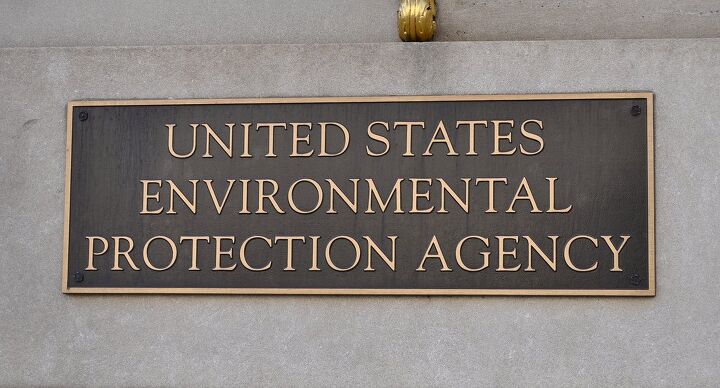EPA Ends Bid to Further Justify Itself

The Environmental Protection Agency (EPA) is dropping proposed policy language that would have done, well, nothing.
That’s right, and it would have made a great Seinfeld story line: faceless bumbling government agency seeks to reframe public debate with a redundant, unenforceable, and unnecessary policy revision only to meet unanticipated wrath from industry and enthusiasts, forcing it to ultimately retract its proposal.
The episode began in June when the EPA published a 600-page proposal focused on reducing carbon emissions for medium- and heavy-duty trucks. A sliver of the policy proposal dealt with prohibiting the modification or removal of emissions equipment when converting on-road vehicles into racecars. Such regulation has long been in place, and has been reaffirmed through legislative action on multiple occasions since passage of the Clean Air Act in 1963.
Predictably, the proposal attracted attention from Specialty Equipment Market Association (SEMA), the mouthpiece for the $36 billion aftermarket. It released a strongly worded response to the proposal in February. A few days later, Motor Trend’s Scott Evans published a well worded, if controversial, editorial that was swiftly removed from MT’s website but lives on in part here. Mr. Evans called into question the purpose of the proposal and called out SEMA as “paranoid and reactionary.” Since then, the EPA has not convincingly articulated the value of its proposed “policy clarification,” but we have a few ideas. The aftermarket, media, and enthusiasts have been up in arms over this for most of 2016.
This week, Congress got in on the action. House Energy and Commerce Committee Chairman Fred Upton R-Michigan stated in a letter to EPA Administrator Gina McCarthy, “We remain doubtful that this proposed policy change complies with Congressional intent.”
Perhaps scrutiny from the legislative branch was the last straw, because the EPA subsequently announced removal of the controversial language. According to Automotive News, the EPA released a statement, “Since our attempt to clarify led to confusion, EPA has decided to eliminate the proposed language from the final rule.”
The episode ends much as it began, with a policy debate about as substantive as the contents of George Costanza’s Penske File.
[Image: TexasGOPVote.com/Flickr]

Twenty year auto industry professional. Currently CEO at Turbo International, the premier American manufacturer of OEM replacement turbochargers for the global aftermarket.
More by Seth Parks
Latest Car Reviews
Read moreLatest Product Reviews
Read moreRecent Comments
- Honda1 Unions were needed back in the early days, not needed know. There are plenty of rules and regulations and government agencies that keep companies in line. It's just a money grad and nothing more. Fain is a punk!
- 1995 SC If the necessary number of employees vote to unionize then yes, they should be unionized. That's how it works.
- Sobhuza Trooper That Dave Thomas fella sounds like the kind of twit who is oh-so-quick to tell us how easy and fun the bus is for any and all of your personal transportation needs. The time to get to and from the bus stop is never a concern. The time waiting for the bus is never a concern. The time waiting for a connection (if there is one) is never a concern. The weather is never a concern. Whatever you might be carrying or intend to purchase is never a concern. Nope, Boo Cars! Yeah Buses! Buses rule!Needless to say, these twits don't actual take the damn bus.
- MaintenanceCosts Nobody here seems to acknowledge that there are multiple use cases for cars.Some people spend all their time driving all over the country and need every mile and minute of time savings. ICE cars are better for them right now.Some people only drive locally and fly when they travel. For them, there's probably a range number that works, and they don't really need more. For the uses for which we use our EV, that would be around 150 miles. The other thing about a low range requirement is it can make 120V charging viable. If you don't drive more than an average of about 40 miles/day, you can probably get enough electrons through a wall outlet. We spent over two years charging our Bolt only through 120V, while our house was getting rebuilt, and never had an issue.Those are extremes. There are all sorts of use cases in between, which probably represent the majority of drivers. For some users, what's needed is more range. But I think for most users, what's needed is better charging. Retrofit apartment garages like Tim's with 240V outlets at every spot. Install more L3 chargers in supermarket parking lots and alongside gas stations. Make chargers that work like Tesla Superchargers as ubiquitous as gas stations, and EV charging will not be an issue for most users.
- MaintenanceCosts I don't have an opinion on whether any one plant unionizing is the right answer, but the employees sure need to have the right to organize. Unions or the credible threat of unionization are the only thing, history has proven, that can keep employers honest. Without it, we've seen over and over, the employers have complete power over the workers and feel free to exploit the workers however they see fit. (And don't tell me "oh, the workers can just leave" - in an oligopolistic industry, working conditions quickly converge, and there's not another employer right around the corner.)































Comments
Join the conversation
SEMA is still lobbying for the passage of the RPM bill, which would statutorily restrict the EPA from regulating vehicles modified for off-road use, including racing. There once was a concept of enabling legislation. Since the bureaucratic leviathan seems unrestrained by little things like actual laws (see the Dept of Education's "Dear Colleague" letter that the agency admits has no basis in law but has created hysteria, word choice intended, about a non-existent epidemic of sexual assault on campus), it is now necessary to pass restricting legislation to make it clear to the executive branch that they can't just do whatever they want to do.
Any money saved will be used to prosecute man-made, western-based climate change deniers and to throw them in jail. Or the money will be used to buy 1/20th of the next designer dress that Moochelle My Belle wears showing how she relates to us little people.